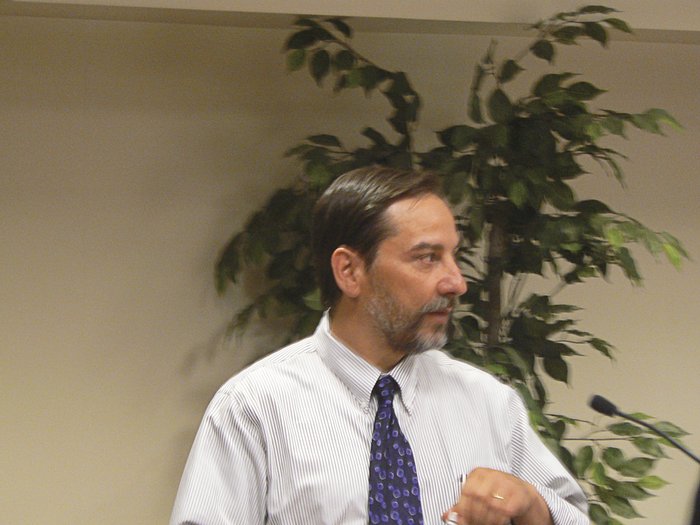A Superior Court judge’s order that Planning Board consideration of the Appleview condominium project must include testimony from Transco Williams, owners of a high pressure natural gas pipeline that crosses the property and has nearby homeowners worried, led to major wrangling on Tuesday between attorneys for the pipeline company and residents.
Neighbors of the proposed site of the condo development at the North Bergen/Guttenberg border have expressed concerns over the proposed 59-unit project for the three years it has gone before both the North Bergen and Hudson County planning boards. Among the opponents of the project are residents of Guttenberg’s Galaxy Towers hi-rise. Their main concern is that construction of the development might disrupt the high-pressure pipeline that crosses a section of the project’s property.
The North Bergen Planning Board approved the project last year, but the matter was remanded back to the board after Judge Christine Farrington said the board did not sufficiently determine whether safety considerations had been met. She said testimony from a Transco representative should have been required.
“That’s an unfair burden. The board has to make a decision.” – Galaxy Attorney John Lamb
____________
The three-hour hearing on Tuesday, a continuation of last month’s meeting, included testimony from a Transco expert and was largely concerned with Galaxy Towers Attorney John Lamb’s complaint that insufficient documentation had been provided by Transco to support the testimony of their expert, Jose Rodriguez.
Lamb had submitted a subpoena to the board following last month’s hearing in order to obtain more documentation from Transco. The board served the subpoena to Transco, who in turn supplied some, but apparently not all, of the requested documentation.
The skirmishing between lawyers began at the outset when Planning Board attorney Steven Muhlstock suggested that the board ask Judge Farrington to decide whether or not Lamb deserved to receive all of the documents he requested.
“That’s an unfair burden,” Lamb said, later adding, “The board has to make a decision. The remedy for the board is very simple, Mr. Muhlstock. If they don’t produce the [documentation], you can strike [Rodriguez’] testimony [from the record].”
“I have no problem with that,” said Muhlstock. He then suggested the board weigh Rodriguez’ testimony based on the documents that were produced from the subpoena. The pipeline company’s attorneys were satisfied with this suggestion.
“We believe the board has all the information it needs [to make a decision],” said Transco attorney Mark Stevens.
The board voted not to strike Rodriguez’ testimony from the record.
Scope of the hearing
A recurring issue during the hearing was whether Lamb’s cross-examination of Rodriguez was within the scope of Judge Farrington’s remand, which required that safety considerations be addressed by a Transco representative. When Lamb asked Rodriguez about the status of the pipeline following construction, Richard Tucker, another Transco attorney, objected.
“We’re not here for a general symposium on pipeline safety,” said Tucker. “There’s nothing in the judge’s opinion that would take us that far afield of where we are. We should keep ourselves within that scope.”
“For an attorney [Tucker] to interpret what a judge meant while not having appeared during the [initial] planning proceedings is not appropriate,” said Lamb. He insisted consideration of the safety condition of the pipeline following construction should be considered.
“[Safety during] construction is a major issue, but it’s also about how this [pipeline] works after construction,” said Lamb.
Muhlstock then asked Lamb if he believed Appleview should not be built at all.
“That’s not my position,” said Lamb. “It may be my client’s position. A project that’s built within the parameters of the zoning code in a safe manner that minimizes the risk to the pipeline [is relevant].”
Appleview attorney Carmine Alampi then said that he “vehemently disagrees” that the scope of the remand pertains to the ongoing maintenance of the area.
Safer scenarios?
The latter part of Lamb’s approach to the hearing focused on whether Transco and the developer are ensuring that the safest possible method of construction is being met. Lamb referred to a pamphlet from the Federal Energy Regulatory Commission that offers guidelines on how much space construction vehicles should have when working near a pipeline in order to avoid a possible rupture.
The pamphlet says that during construction a right-of-way easement for vehicles is generally 75 to 100 feet wide. The permanent right-of-way, the pamphlet reads, is usually 50 feet wide for routine mowing or cutting of vegetation.
According to Rodriguez, the current proposed easement is only 25 feet wide.
“If there was a 50 feet easement,” asked Lamb, “would that be safer than the current proposed easement?”
“No, it’s not safer,” said Rodriguez, later adding, “it’s easier to work with 50 feet but it’s not safer.”
Lamb later said that Transco, a for-profit organization, is getting this easement for free from Appleview, suggesting that was the reason Transco did not opt for a larger right-of-way during construction. Lamb also questioned previous testimony from Rodriguez, who had said that Transco and Appleview agreed to have an inspector on site at all times during construction.
“So now that’s been changed,” said Lamb. “Now it’s only [during] specific construction activities.”
“To have someone there all the time would be a waste of manpower,” said Rodriguez. “It’s not necessary.”
Lamb sauggested that Rodriguez reduced the supervision after discussions with Transco and Appleview.
“No, I conferred with my larger team,” said Rodriguez. “There was no need to go beyond [what is required].”
The Appleview hearings will continue Tuesday, May 1.
Stephen LaMarca may be reached at slamarca@hudsonreporter.com.
